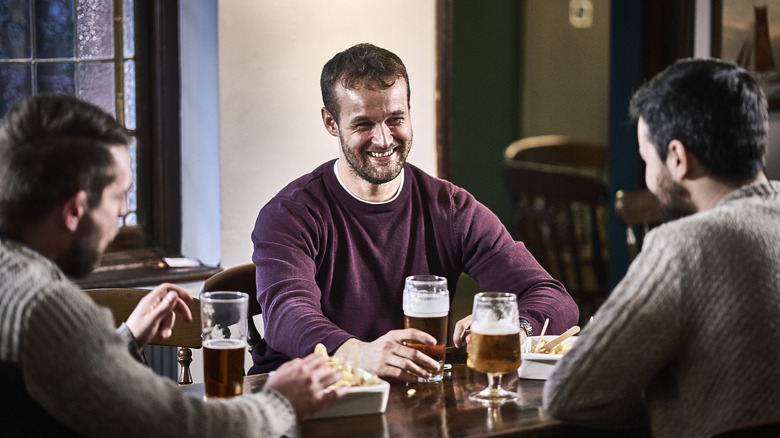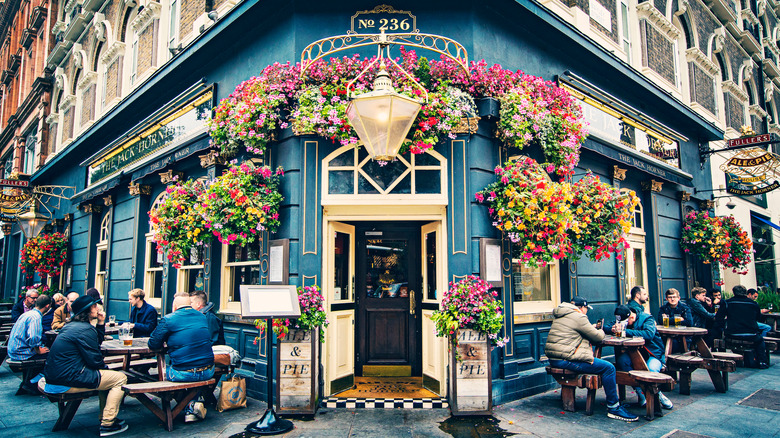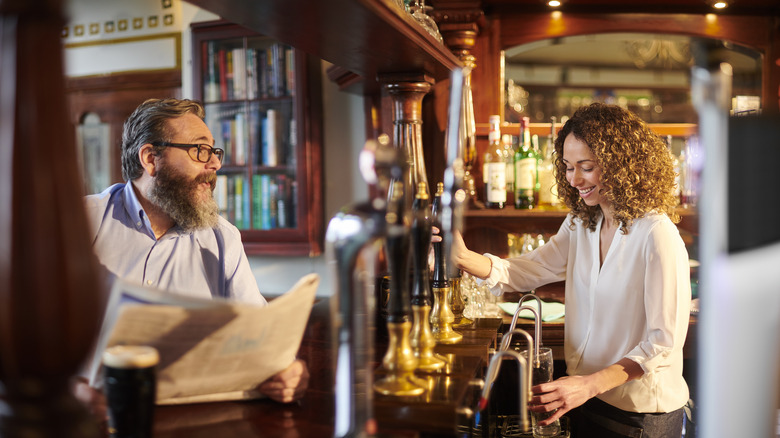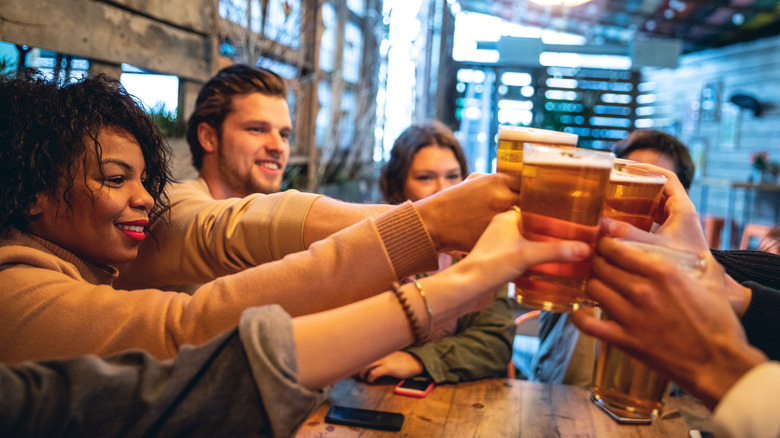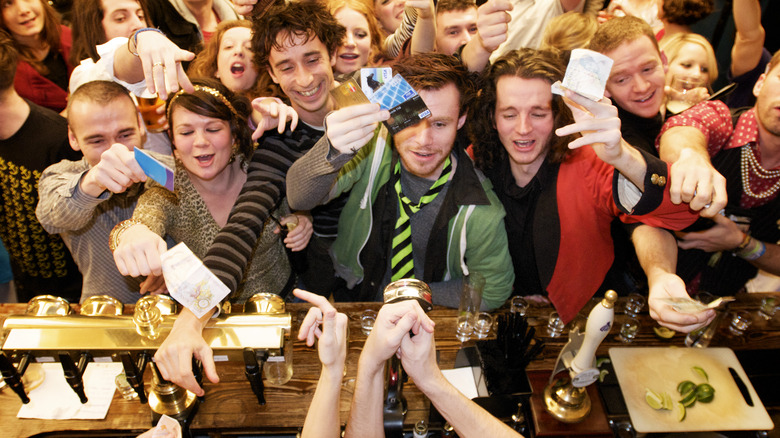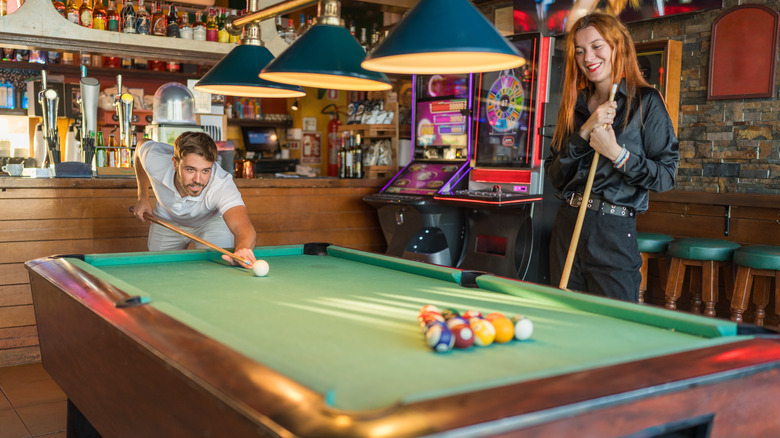Unspoken Etiquette Rules To Avoid Standing Out As A Total Tourist In A British Pub
If you watch some of the U.K.'s best-loved TV shows, you'd be forgiven for thinking that Brits spend half their lives down the pub. In "Coronation Street" — the world's longest-running soap opera — the people of a working-class neighborhood are always stopping off for a pint in the Rovers Return Inn. The same goes for the Queen Vic in "Eastenders," The Woolpack in "Emmerdale," and the Nag's Head in "Only Fools and Horses." This reflects how central real-life pubs are to many communities across the country, and a trip to a traditional British boozer is essential when traveling to the U.K. But there are some unspoken rules that you should be familiar with if you want to avoid standing out as a tourist.
Everyone has their idea of what a "typical British boozer" actually is. It could be a sticky-carpeted back street pub, a cozy local serving real ale to beer aficionados, or a rambling centuries-old country inn way out in the sticks. In towns and cities, chain pubs with virtually identical interiors are increasingly the norm. One of the most ubiquitous is Wetherspoons, which gets a bad rap but at least maintains a price point where anyone can afford a pint. Some pubs are rowdy while others are sedate, and the etiquette is subtly different depending on which venue you choose. However, if you visit the right one with a group of great people, you'll have an unforgettable night out — if you gently acknowledge the rules.
Always read the room when entering a pub
Reading the room as you enter a pub will often provide a feel for how patrons are expected to behave and how others might behave towards you. Some more traditional pubs are divided into two distinct rooms: The bar and the lounge. The bar is usually the domain of more gregarious regulars who might want to chat with newcomers or challenge them to a game of pool. The lounge area tends to be a quieter place for enjoying a pint with less interaction with other drinkers.
Some community pubs offer weekday specials for seniors, which are a vital way for older people (especially those who live alone) to enjoy a cheap bite and a bit of company. In this scenario, it's not polite to whack on a bunch of tunes on the jukebox. Doing so might provoke some heavy tutting from the regulars.
Similarly, pubs catering to older customers can have a strange attitude towards children on the premises. It was illegal for people under the age of 14 to enter a pub before the laws changed in 1995, yet old-fashioned attitudes die hard in some places. It is up to the landlord's discretion who they serve and few will ban kids outright, but some grizzled regulars still regard pubs as a place for grown-ups only. If the atmosphere gets weird when you enter with a child, you could be better off finding a more family-oriented place for a drink.
Order your drinks at the bar
Unless you are in a gastropub with a dedicated dining area, it is safer to assume there is no table service in British pubs. Drinks, snacks, and even meals are ordered at the bar. Brits are world-famous for their love of queues, and you will see a masterclass of invisible queuing in pubs. While punters awaiting service are dotted around the bar at random, everyone, including the bar staff, knows exactly who is next.
The trick is to get yourself noticed without looking over-eager or being rude about it. It is a subtle balancing act, and waving your money around, calling out, or overt gestures of impatience are sure-fire ways to get ignored for longer. The commonly accepted method is to casually place yourself at the bar with a look of optimism and catch the bartender's eye. A brief smile, nod, or hopeful raise of the eyebrows is enough to secure your place in their mental queue. You might hear some people calling out things like: "When you're ready, mate!" but don't be tempted to follow suit. That kind of behavior is reserved only for regulars.
Have your order ready when it is your turn. Most pubs will have a selection of keg lagers on tap, plus a few ales and some special offers. Simply saying you'd like a beer will likely irk the bartender, and they may move on to someone else if you take too long to make up your mind.
Rounds and tipping
If you are hitting the pub with friends from the U.K., it won't be long before someone asks: "Right, who's getting the first round in?" Taking turns to buy drinks for everyone in the group is an essential part of the British pub-going experience built on camaraderie and trust. It also makes good sense; without table service, it saves each person trudging up to the bar to order individually.
The crucial unspoken rule of round-buying is that all members of the group will buy a round before the drinking session comes to a close. If you can't afford a round or don't want to participate, you should say so upfront and stick to buying your own drinks. Otherwise, don't think you can sit quietly and expect to get away without taking your turn — everyone present will know exactly who has bought what. If you are drinking with a larger group, it is acceptable to split it up into smaller rounds to prevent the bill from becoming too expensive. Usually, the person getting the round will go to the bar alone, but it is also common to take someone else along to help carry the drinks.
Tipping is neither obligatory nor expected in British pubs. However, it is normal to tell the bartender to keep the change or offer to buy them a drink as part of the round. In the latter case, it's up to them whether they pour one for themselves or discreetly pocket the cash.
Privacy and personal space
Brits generally like to keep themselves to themselves and instinctively respect other people's personal space. These borders are somewhat more relaxed in a pub where it can become crowded, and it is more socially acceptable to strike up conversation with total strangers. Respecting other people's personal bubbles can present a challenge if you are trying to get to the bar when it is stacked four deep, and needlessly jostling other customers is one way to start trouble. The best approach is to stay alert to small gaps opening up and slide through while making as little bodily contact as possible.
If you stay at the bar after buying a drink, regulars might see that as an invitation to engage you in small talk or light banter. On the other hand, sitting at a table is generally accepted as an indication that you want to keep to yourself or your group. Even so, tables in the vicinity of the bar may still fall into the banter zone. Further away, tables are your private little island, and seated people won't usually interact with their neighbors, no matter how closely spaced the tables are.
One thing to be careful of is making eye contact with other patrons. Avoiding looking at people is one of the easiest ways to blend in on a visit to the U.K., and that goes double for another person's partner. If you are suspected of checking out someone's date, you might get an aggressive response.
Fun and games in British pubs
Many pubs will have some entertainment available, most commonly a coin-operated pool table and dart board. There will also be a queuing system if they are already occupied. For pool, it is common practice to place a coin on the side of the table to indicate you want to play. Some pub pool tables operate on a "winner stays on" basis where the current player risks ceding control of the table to a challenger. This can be a bit annoying if you just want to play with a friend, but you can suggest pairing up as doubles so you both get a game. If you are controlling the table, it is common courtesy not to line up 10 games worth of coins to stay on. Hogging the table can generate bad feelings.
Playing darts is usually free. Some regulars will bring their own set of arrows, but most pubs will have a motley selection of house darts for everyone to use, usually kept in a mug behind the bar. Getting a game operates in a similar manner to pool, joining the queue by adding your name to the chalkboard next to the playing area. If you end up playing a stranger, bear in mind that some pub regulars take their darts pretty seriously and don't appreciate larking about or distractions. If you come up short against your opponent, don't be surprised if you are asked to mark the next game. If you lose at either pool or darts, a handshake will usually suffice, but buying the victor a pint is always appreciated!
